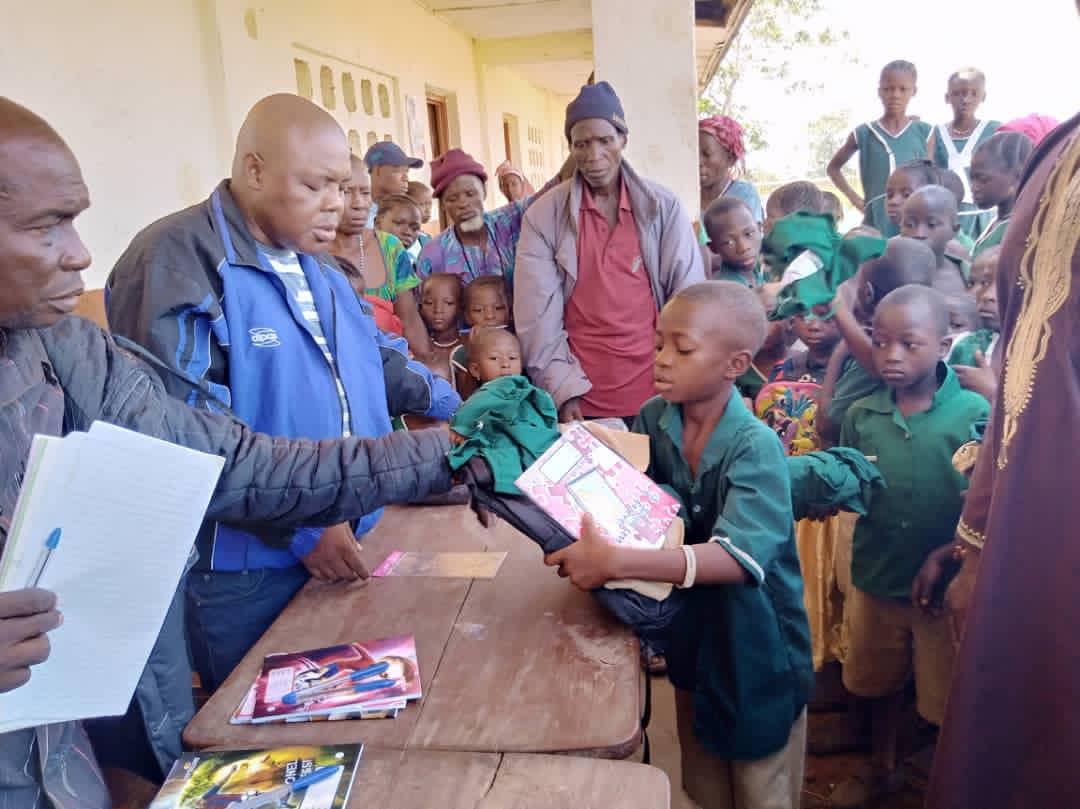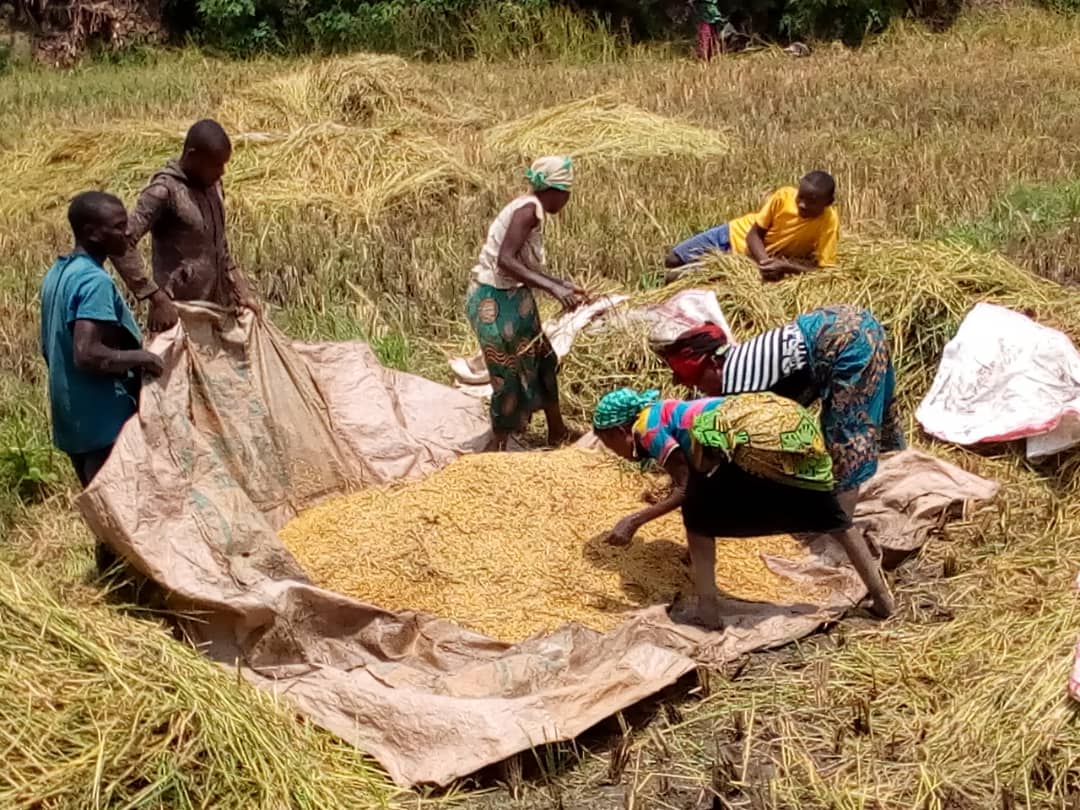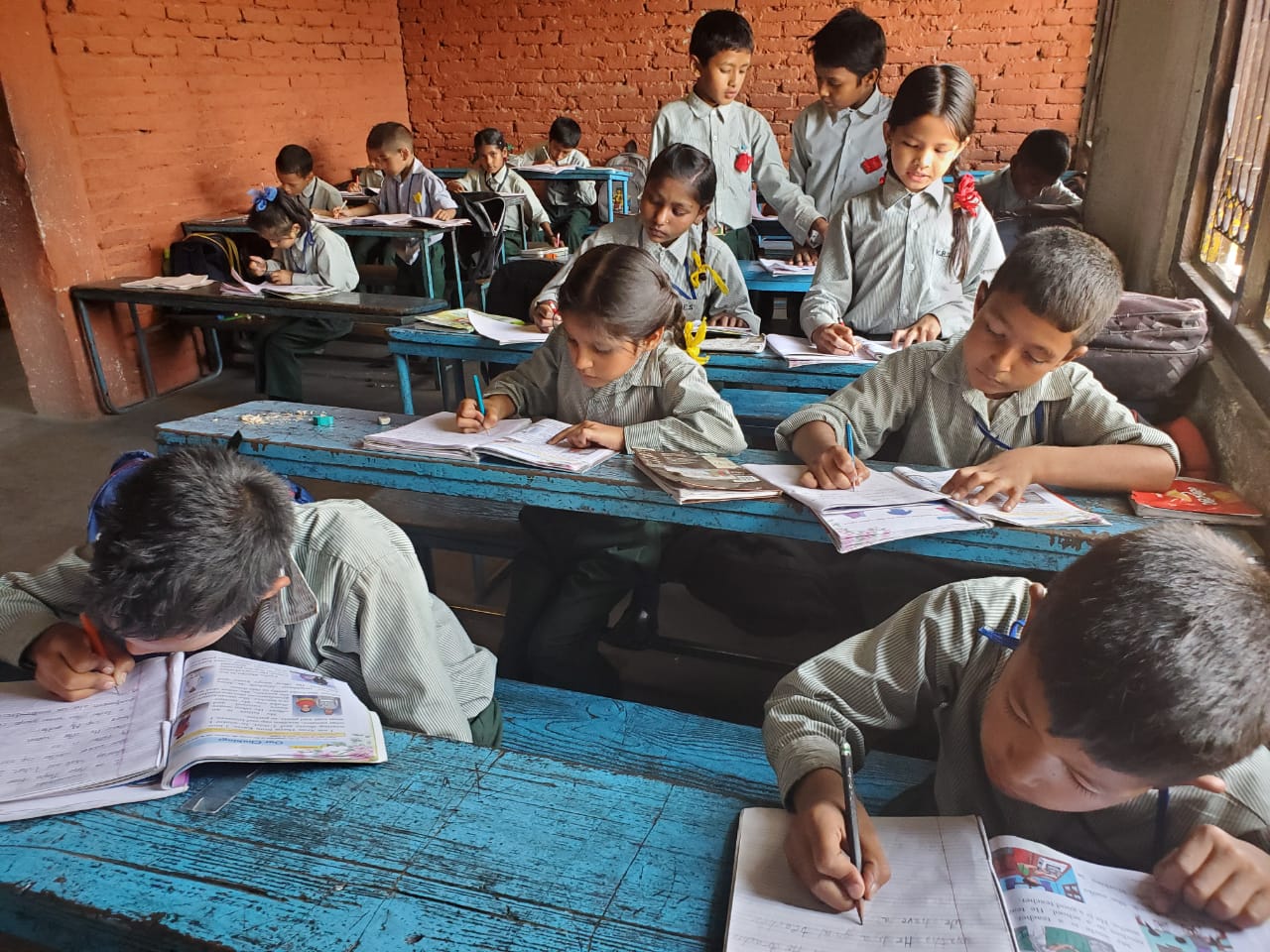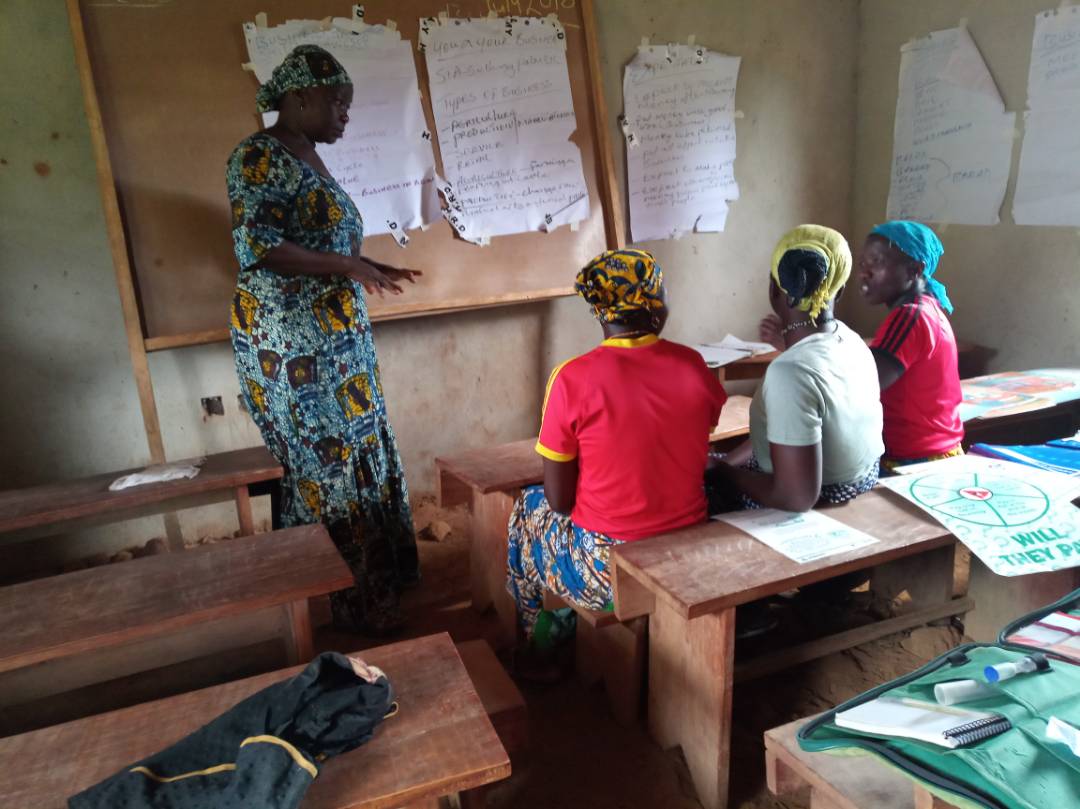Magazine
Magazine
A Critical Innovative Approach for a More Contemporary
“Development Aid”
A Critical Innovative Approach for a More Contemporary “Development Aid”
A Critical Innovative Approach for a More Contemporary
“Development Aid”
KETAAKETI - How poorest countries develop themselves
KETAAKETI - How poorest countries develop themselves
KETAAKETI - How poorest countries develop themselves
Many concepts of "classic development aid" do not work as they should: instead of providing sustainable support to the countries of the Global South, they make them even more dependent on the industrialized nations through supposed aid projects. The result: The global gap between rich and poor is not being bridged, but strengthened.
Anneli-Sofia Raecker - founder of KETAAKETI - has a different vision: With her model KETAAKETI she wants a global network of NGOs create , in which wealthier nations work together with the poorest countries to solve their problems together and in a self-determined manner.
Her goal: economic and socio-cultural independence for the poorest countries.
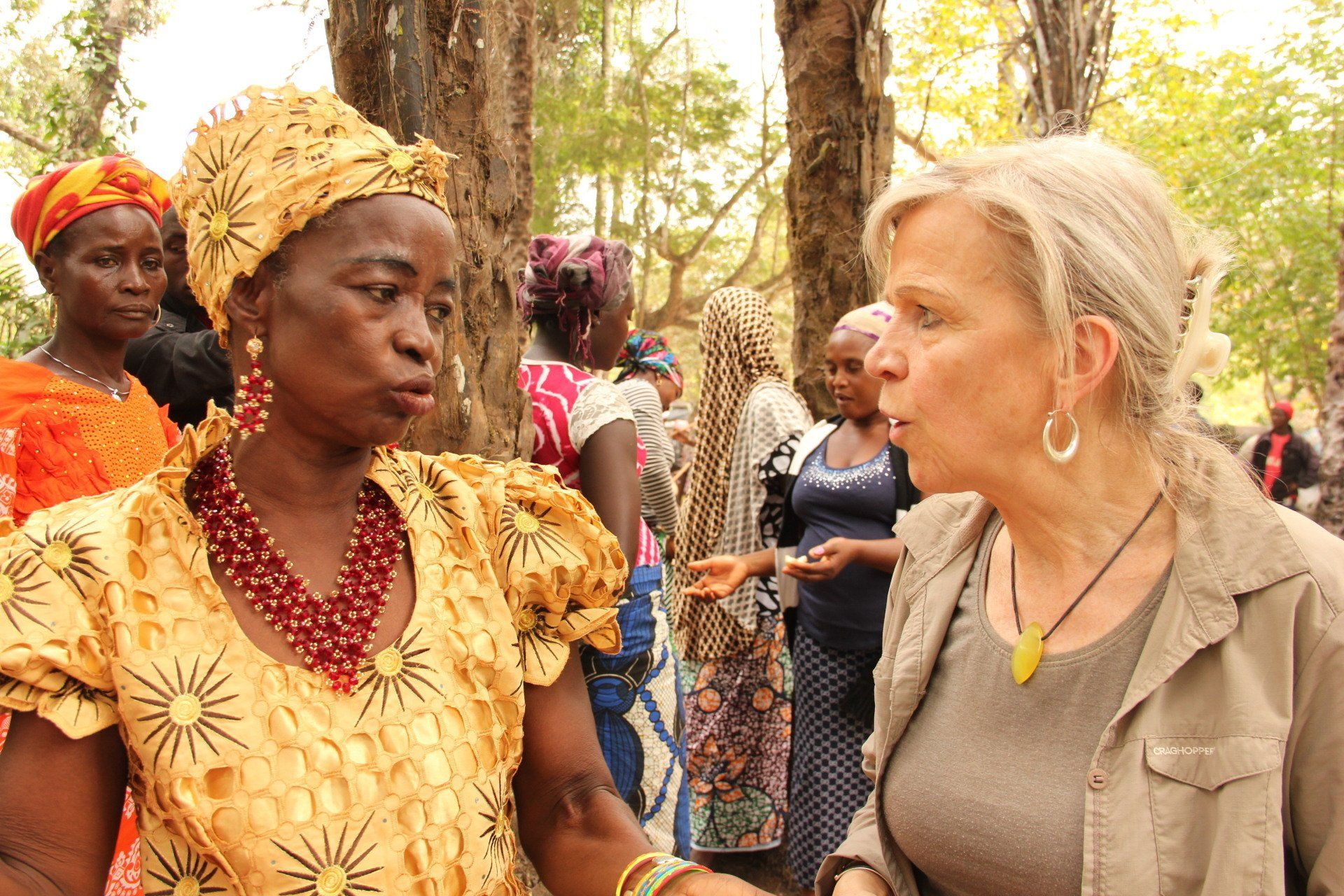
Anneli-Sofia Raecker and a teacher in Sierra Leone exchange ideas.
Many concepts of "classic development aid" do not work as they should: instead of providing sustainable support to the countries of the Global South, they make them even more dependent on the industrialized nations through supposed aid projects. The result: The global gap between rich and poor is not being bridged, but strengthened.
Anneli-Sofia Raecker - founder of KETAAKETI - has a different vision:
With her model KETAAKETI she wants a global network of NGOs create , in which wealthier nations work together with the poorest countries to solve their problems together and in a self-determined manner.
Her goal: economic and socio-cultural independence for the poorest countries.

Anneli-Sofia Raecker and a teacher in Sierra Leone exchange ideas.
Many concepts of "classic development aid" do not work as they should: instead of providing sustainable support to the countries of the Global South, they make them even more dependent on the industrialized nations through supposed aid projects. The result: The global gap between rich and poor is not being bridged, but strengthened.
Anneli-Sofia Raecker - founder of KETAAKETI - has a different vision: With her model KETAAKETI she wants a global network of NGOs create , in which wealthier nations work together with the poorest countries to solve their problems together and in a self-determined manner.
Her goal: economic and socio-cultural independence for the poorest countries.

Anneli-Sofia Raecker and a teacher in Sierra Leone exchange ideas.
Shortly in advance: What do we mean by a "criticism"?
It is not our aim to attack and
blame others. We want to show an innovative approach from which "classic development aid" can benefit. We want to find solutions together and not work against each other. We rely on constructive criticism so that we can all develop together.
Overview:
What is this about?
3 criticisms of “classic development aid”
From "classic development aid" to development cooperation
The characteristics of modern development cooperation
How KETAAKETI differs from "classic development aid" - 12 points
A glimpse into the future: Community development cooperationsince
Shortly in advance: What do we mean by a "criticism"?
It is not our aim to attack and blame others. We want to show an innovative approach from which "classic development aid" can benefit. We want to find solutions together and not work against each other. We rely on constructive criticism so that we can all develop together.
Overview: what is this about?
3 criticisms of “classic development aid”
From "classic development aid" to development cooperation
The characteristics of modern development cooperation
How KETAAKETI differs from "classic development aid" - 12 points
A glimpse into the future: Community development cooperationsince
Shortly in advance: What do we mean by a "criticism"?
It is not our aim to attack and blame others. We want to show an innovative approach from which "classic development aid" can benefit. We want to find solutions together and not work against each other. We rely on constructive criticism so that we can all develop together.
Why "classic development aid" is no longer up-to-date - 3 important points of criticism
Why "classic development aid" is no longer up-to-date - 3 important points of criticism
The term "development aid" and the way in which "classical development aid" is practiced is no longer up to date and makes sense (and perhaps never was). This is due to various factors:
The term "development aid" and the way in which "classical development aid" is practiced is no longer up to date and makes sense (and perhaps never was). This is due to various factors:
The term "development aid" and the way in which "classical development aid" is practiced is no longer up to date and makes sense (and perhaps never was). This is due to various factors:
1. "Classic development aid" is hierarchically oriented.
Rich countries are understood as donors and the people of poor countries as recipients. However, this donor-recipient thinking of "classic development aid" implies dependencies that ultimately help nobody. The dependencies and the anchored donor-recipient mentality on both sides prevent the "recipient side" from developing their own motivations and activities. However, they are essential so that development cooperation can lead to long-term and sustainable success.
1. "Classic development aid" is hierarchically oriented.
Rich countries are understood as donors and the people of poor countries as recipients. However, this donor-recipient thinking of "classic development aid" implies dependencies that ultimately help nobody. The dependencies and the anchored donor-recipient mentality on both sides prevent the development of their own motivations and activities on the "recipient side". However, they are essential so that development cooperation can lead to long-term and sustainable success.
1. "Classic development aid" is hierarchically oriented.
Rich countries are understood as donors and the people of poor countries as recipients. However, this donor-recipient thinking of "classic development aid" implies dependencies that ultimately help nobody. The dependencies and the anchored donor-recipient mentality on both sides prevent the "recipient side" from developing their own motivations and activities. However, they are essential so that development cooperation can lead to long-term and sustainable success.

Self-organized women's cooperatives work with microfinance in Nepal
“Externally determined development aid does not help anyone. In the worst case, it overwhelms the giver and the taker gains nothing.”
Anneli-Sofia Raecker

Self-organized women's cooperatives work with microfinance in Nepal
“Externally determined delevopment aid does not help anyone. In the worst case, it overwhelms the giver and the taker gains nothing.”
Anneli-Sofia Raecker

Self-organized women's cooperatives work with microfinance in Nepal
“Externally determined development aid does not help anyone. In the worst case, it overwhelms the giver and the taker gains nothing.”
Anneli-Sofia Raecker
2. The term and form of "classic development aid" is offending.
It is clear that many people in poor countries are in need of help. However, constantly treating someone as needy or stigmatizing them is offending. The basis of a cooperation must begin with the financially indigent people themselves: "What resources do you have yourself, where are your strengths, strengths and motivation?" When working with financially indigent people, it is always important to communicate with each other on an equal footing. In summary: Poor people are not primarily in need of help, but people who have their own resources and strength - this perspective must be clear on both sides of the cooperation.
Poverty and hunger are eroding the will to live of many people. It is incredibly important that these people create their own successes from their own motivation - it is not always easy, but it is essential for our work at KETAAKETI. It shouldn't be about "feeding" people in the long run. It has to be about supporting them to use their own resources to successfully use seed funding – and to do it in a new way. The aim is to use microfinance successfully through solidarity and sustainable passing on. Together we look at what people can already do and provide support where support is still needed.
2. The term and form of "classic development aid" is offending.
It is clear that many people in poor countries are in need of help. However, constantly treating someone as needy or stigmatizing them is offending. The basis of a cooperation must begin with the financially indigent people themselves: "What resources do you have yourself, where are your strengths, strengths and motivation?" When working with financially indigent people, it is always important to communicate with each other on an equal footing. In summary: Poor people are not primarily in need of help, but people who have their own resources and strength - this perspective must abe clear on both sides of the cooperation.
Poverty and hunger are eroding the will to live of many people. It is incredibly important that these people create their own successes from their own motivation - it is not always easy, but it is essential for our work at KETAAKETI. It shouldn't be about "feeding" people in the long run. It has to be about supporting them to use their own resources to successfully use seed funding – and to do it in a new way. The aim is to use microfinance successfully through solidarity and sustainable passing on. Together we look at what people can already do and provide support where support is still needed.
2. The term and form of "classic development aid" is offending.
It is clear that many people in poor countries are in need of help. However, constantly treating someone as needy or stigmatizing them is offending. The basis of a cooperation must begin with the financially indigent people themselves: "What resources do you have yourself, where are your strengths, strengths and motivation?" When working with financially indigent people, it is always important to communicate with each other on an equal footing. In summary: Poor people are not primarily in need of help, but people who have their own resources and strength - this perspective must abe clear on both sides of the cooperation.
Poverty and hunger are eroding the will to live of many people. It is incredibly important that these people create their own successes from their own motivation - it is not always easy, but it is essential for our work at KETAAKETI. It shouldn't be about "feeding" people in the long run. It has to be about supporting them to use their own resources to successfully use seed funding – and to do it in a new way. The aim is to use microfinance successfully through solidarity and sustainable passing on. Together we look at what people can already do and provide support where support is still needed.
3. "Classic development aid" is symptom-oriented aid.
“Classic development aid” is not sustainable. However, it is important to think preventively – to make migration unnecessary, for example. This is the only way we can sustainably secure homes in the poorest countries in the world, limit the causes of flight and not overwhelm western countries. An excessive demand that is often expressed through racist thinking.
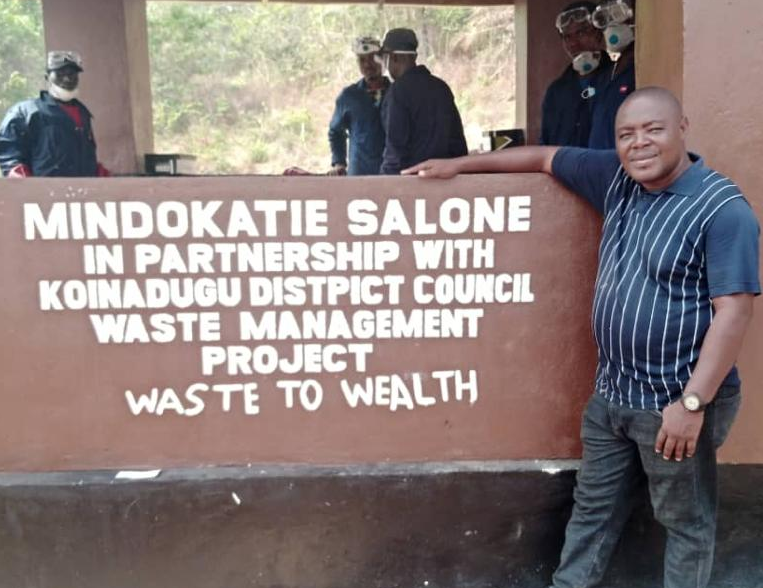
"Waste to Wealth" - an initiative of the KETAAKETI partner
Mindokatie Salone to collect and recycle rubbish.
3. "Classic development aid" is symptom-oriented aid.
“Classic development aid” is not sustainable. However, it is important to think preventively – to make migration unnecessary, for example. This is the only way we can sustainably secure homes in the poorest countries in the world, limit the causes of flight and not overwhelm western countries. An excessive demand that is often expressed through racist thinking.

"Waste to Wealth" - an initiative of the KETAAKETI partner
Mindokatie Salone to collect and recycle rubbish.
3. "Classic development aid" is symptom-oriented aid.
“Classic development aid” is not sustainable. However, it is important to think preventively – to make migration unnecessary, for example. This is the only way we can sustainably secure homes in the poorest countries in the world, limit the causes of flight and not overwhelm western countries. An excessive demand that is often expressed through racist thinking.

"Waste to Wealth" - an initiative of the KETAAKETI partner Mindokatie Salone to collect and recycle waste.
“For me, 'classic development aid' is no longer up-to-date because it is not a model for adults. However, we must also understand the poorest people in the world as adults - and not as dependent children. This world needs adults.”
Anneli-Sofia Raecker
“For me, 'classic development aid' is no longer up-to-date because it is not a model for adults. However, we must also understand the poorest people in the world as adults - and not as dependent children. This world needs adults.”
Anneli-Sofia Raecker
“For me, 'classic development aid' is no longer up-to-date because it is not a model for adults. However, we must also understand the poorest people in the world as adults - and not as dependent children. This world needs adults.”
Anneli-Sofia Raecker
From “classic development aid” to development cooperation –
Haiti and Nepal show
why a paradigm shift is so important
Haiti - hardly any development despite large donations
Haiti is a model of failed “classic development aid” that we are familiar with. The 2010 earthquake plunged Haiti – already one of the poorest countries in the world – into a deep crisis. But despite the enormous amount of donations (please refer watering can principle) Haiti is still on the brink today. Corruption, chaos and hopelessness are the results of failed "classic development aid". Haiti shows that money alone is not a "miracle cure" and can even cause harm. And that development work only works if the helpers talk to the local people and involve them.
From “classic development aid” to development cooperation –
Haiti and Nepal show
why a paradigm shift is so important
Haiti - hardly any development despite large donations
Haiti is a model of failed “classic development aid” that we are familiar with. The 2010 earthquake plunged Haiti – already one of the poorest countries in the world – into a deep crisis. But despite the enormous amount of donations (please refer watering can principle) Haiti is still on the brink today. Corruption, chaos and hopelessness are the results of failed "classic development aid". Haiti shows that money alone is not a "miracle cure" and can even cause harm. And that development work only works if the helpers talk to the local people and involve them.
From “classic development aid” to development cooperation –
Haiti and Nepal show why a paradigm shift is so important
Haiti - hardly any development despite large donations
Haiti is a model of failed “classic development aid” that we are familiar with. The 2010 earthquake plunged Haiti – already one of the poorest countries in the world – into a deep crisis. But despite the enormous amount of donations (please refer watering can principle) Haiti is still on the brink today. Corruption, chaos and hopelessness are the results of failed "classic development aid". Haiti shows that money alone is not a "miracle cure" and can even cause harm. And that development work only works if the helpers talk to the local people and involve them.
Large, untargeted amounts of money often cause corruption and dependencies.
Especially in poor countries, large amounts of money often lead to structures that are very susceptible to corruption. Funds often do not arrive where they should – also known as the watering can principle. In addition, the large sums usually lead to further dependencies, since they prevent national developments. Much better are therefore: Detailed agreements and very small sums that require and encourage personal initiative.
Large, untargeted amounts of money often cause corruption and dependencies.
Especially in poor countries, large amounts of money often lead to structures that are very susceptible to corruption. Funds often do not arrive where they should – also known as the watering can principle. In addition, the large sums usually lead to further dependencies, since they prevent national developments. Much better are therefore: Detailed agreements and very small sums that require and encourage personal initiative.
Large, untargeted amounts of money often cause corruption and dependencies.
Especially in poor countries, large amounts of money often lead to structures that are very susceptible to corruption. Funds often do not arrive where they should – also known as the watering can principle. In addition, the large sums usually lead to further dependencies, since they prevent national developments. Much better are therefore: Detailed agreements and very small sums that require and encourage personal initiative.
Lack of communication with the local people.
Many people - for example in Haiti - have lost their homes. A lot of money was put into the construction of new accommodation. Shelters that caused fear among many Haitians. Because they were built according to patterns that did not correspond to the Haitian culture. Just one example that shows that "classic development aid" often puts money into projects and measures without taking into account the conditions and culture of the country. But the local people know best where and how the money is important. Because they are the experts of their country - and not us.
Lack of communication with the local people.
Many people - for example in Haiti - have lost their homes. A lot of money was put into the construction of new accommodation. Shelters that caused fear among many Haitians. Because they were built according to patterns that did not correspond to the Haitian culture. Just one example that shows that "classic development aid" often puts money into projects and measures without taking into account the conditions and culture of the country. But the local people know best where and how the money is important. Because they are the experts of their country - and not us.
Lack of communication with the local people.
Many people - for example in Haiti - have lost their homes. A lot of money was put into the construction of new accommodation. Shelters that caused fear among many Haitians. Because they were built according to patterns that did not correspond to the Haitian culture. Just one example that shows that "classic development aid" often puts money into projects and measures without taking into account the conditions and culture of the country. But the local people know best where and how the money is important. Because they are the experts of their country - and not us.
Development work is still in someone else's hands.
Major emergencies require quick help. It is clear that this should also come from outside. However, the time is often missed when the countries concerned are given the work back into their own hands. However, long-term, externally determined aid often prevents the countries from getting back on their own feet in a self-determined manner.
Development work is still in someone else's hands.
Major emergencies require quick help. It is clear that this should also come from outside. However, the time is often missed when the countries concerned are given the work back into their own hands. However, long-term, externally determined aid often prevents the countries from getting back on their own feet in a self-determined manner.
Development work is still in someone else's hands.
Major emergencies require quick help. It is clear that this should also come from outside. However, the time is often missed when the countries concerned are given the work back into their own hands. However, long-term, externally determined aid often prevents the countries from getting back on their own feet in a self-determined manner.
“It is often the people affected who really need the money who are ultimately accused of misusing the money or not using it. But the fault does not lie with them – it lies with the development aid system.”
Anneli-Sofia Raecker
Promises often remain unfulfilled and create hopelessness.
Many things have been initiated, initiated, have raised hopes. But in the end nothing happened. The hope of further large sums prevents people from activating their own forces and resources. At the same time, there is growing distrust of “classic development aid”. This causes great resentment in the country.
“It is often the people affected who really need the money who are ultimately accused of misusing the money or not using it. But the fault does not lie with them – it lies with the development aid system.”
Anneli-Sofia Raecker
Promises often remain unfulfilled and create hopelessness.
Many things have been initiated, initiated, have raised hopes. But in the end nothing happened. The hope of further large sums prevents people from activating their own forces and resources. At the same time, there is growing distrust of “classic development aid”. This causes great resentment in the country.
“It is often the people affected who really need the money who are ultimately accused of misusing the money or not using it. But the fault does not lie with them – it lies with the development aid system.”
Anneli-Sofia Raecker
Promises often remain unfulfilled and create hopelessness.
Many things have been initiated, initiated, have raised hopes. But in the end nothing happened. The hope of further large sums prevents people from activating their own forces and resources. At the same time, there is growing distrust of “classic development aid”. This causes great resentment in the country.
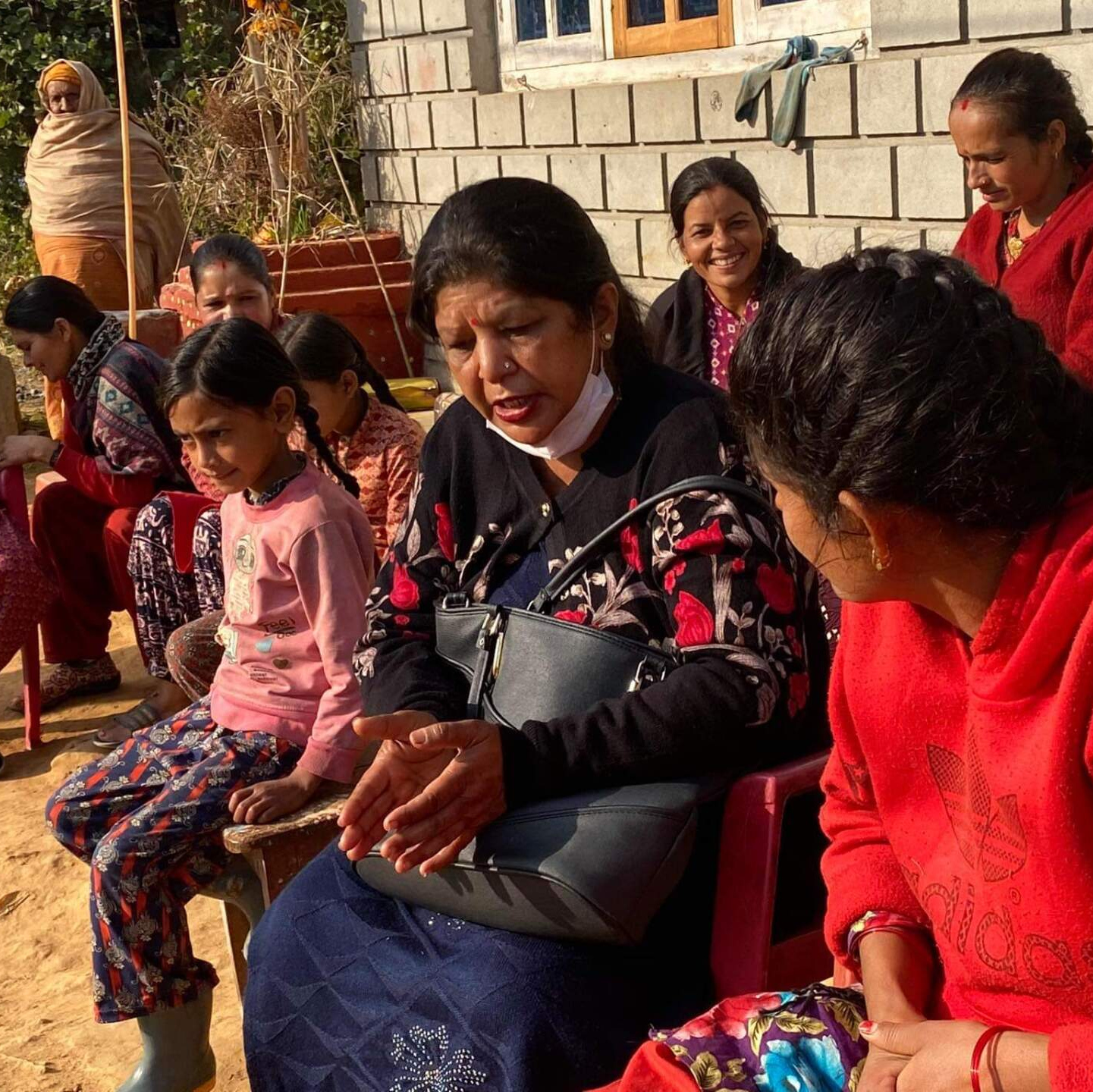



Nepal – foreign aid that cannot be understood
A large number of earthquakes also caused devastation in Nepal in 2015. What was left was chaos and traumatized people. Many organizations helped. Among other things, also helpers who tried to do trauma work with children. But how is that supposed to work if helpers don't speak the children's native language? How should children build trust in people whose language and culture are foreign to them? In Nepal, too, it has been shown how "classic development aid" reaches its limits when helpers do not take the needs, culture and skills of the country into account.
Nepal – foreign aid that cannot be understood
A large number of earthquakes also caused devastation in Nepal in 2015. What was left was chaos and traumatized people. Many organizations helped. Among other things, also helpers who tried to do trauma work with children. But how is that supposed to work if helpers don't speak the children's native language? How should children build trust in people whose language and culture are foreign to them? In Nepal, too, it has been shown how "classic development aid" reaches its limits when helpers do not take the needs, culture and skills of the country into account.
Much better is:
Nepalese social workers trained teachers in Nepalese trauma work. In this way, the teachers were able to carry out trauma exercises with the children in small groups directly in their classes. These are projects worth supporting within the framework of the development cooperation – here the work and the competencies are in the hands of the experts of the country concerned.

Nepal – foreign aid that cannot be understood
A large number of earthquakes also caused devastation in Nepal in 2015. What was left was chaos and traumatized people. Many organizations helped. Among other things, also helpers who tried to do trauma work with children. But how is that supposed to work if helpers don't speak the children's native language? How should children build trust in people whose language and culture are foreign to them? In Nepal, too, it has been shown how "classic development aid" reaches its limits when helpers do not take the needs, culture and skills of the country into account.

Much better is:
Nepalese social workers trained teachers in Nepalese trauma work. In this way, the teachers were able to carry out trauma exercises with the children in small groups directly in their classes. These are projects worth supporting within the framework of the development cooperation – here the work and the competencies are in the hands of the experts of the country concerned.
Much better is:
Nepalese social workers trained teachers in Nepalese trauma work. In this way, the teachers were able to carry out trauma exercises with the children in small groups directly in their classes. These are projects worth supporting within the framework of the development cooperation – here the work and the competencies are in the hands of the experts of the country concerned.
Sustainability, self-determination, partnership at eye level and mutual responsibility - the characteristics of modern development cooperation
Sustainability, self-determination, partnership at eye level and mutual responsibility -
the characteristics of modern development cooperation
Sustainability, self-determination, partnership at eye level and mutual responsibility - the characteristics of modern development cooperation
Sustainability
Sustainability means future-oriented and new thinking. This includes the aspects that are known from the sustainability discussion: social, ecological and economic factors. But at the same time it is about an overall picture of a world development in which everyone is dependent on one another - poor and rich countries alike.
Self-determination
Other points are independence and self-determination. Self-determination means that development is in the hands of the people themselves. These points distinguish it from “classic development aid”.
Sustainability
Sustainability means future-oriented and new thinking. This includes the aspects that are known from the sustainability discussion: social, ecological and economic factors. But at the same time it is about an overall picture of a world development in which everyone is dependent on one another - poor and rich countries alike.
Self-determination
Other points are independence and self-determination. Self-determination means that development is in the hands of the people themselves. These points distinguish it from “classic development aid”.
Sustainability
Sustainability means future-oriented and new thinking. This includes the aspects that are known from the sustainability discussion: social, ecological and economic factors. But at the same time it is about an overall picture of a world development in which everyone is dependent on one another - poor and rich countries alike.
Self-determination
Other points are independence and self-determination. Self-determination means that development is in the hands of the people themselves. These points distinguish it from “classic development aid”.
“Independence and self-determination are central aspects of KETAAKETI development cooperation. They mean full respect for the other person.”

“Independence and self-determination are central aspects of KETAAKETI development cooperation. They mean full respect for the other person.”

“Independence and self-determination are central aspects of KETAAKETI development cooperation. They mean full respect for the other person.”

Partnership at eye level
Cooperation at eye level is a fundamental requirement. Cooperation is only possible if we do not treat the person opposite us like a supplicant. We want to prevent dependencies from developing as a result of our work. It's about,
- to learn from each other
- to have respect for each other as well
- appreciate each other and look closely.
The central way of working at KETAAKETI therefore always includes dialogue and openness to what the other says. Because he is the country's expert - and not us.
Mutual Responsibility
Mutual responsibility is also the basis for cooperation. KETAAKETI supports with small sums that are negotiated. These sums are traded in mutual responsibility. The other side knows that we are not millionaires. So she knows that she has to be very careful and responsible with the money. This is about mutual appreciation, which is also reflected in dealing with money. This is where KETAAKETI differs from “classic development aid”.
Partnership at eye level
Cooperation at eye level is a fundamental requirement. Cooperation is only possible if we do not treat the person opposite us like a supplicant. We want to prevent dependencies from developing as a result of our work. It's about,
- to learn from each other
- to have respect for each other as well
- appreciate each other and look closely.
The central way of working at KETAAKETI therefore always includes dialogue and openness to what the other says. Because he is the country's expert - and not us.
Mutual Responsibility
Mutual responsibility is also the basis for cooperation. KETAAKETI supports with small sums that are negotiated. These sums are traded in mutual responsibility. The other side knows that we are not millionaires. So she knows that she has to be very careful and responsible with the money. This is about mutual appreciation, which is also reflected in dealing with money. This is where KETAAKETI differs from “classic development aid”.
Partnership at eye level
Cooperation at eye level is a fundamental requirement. Cooperation is only possible if we do not treat the person opposite us like a supplicant. We want to prevent dependencies from developing as a result of our work. It's about,
- to learn from each other
- to have respect for each other as well
- appreciate each other and look closely.
The central way of working at KETAAKETI therefore always includes dialogue and openness to what the other says. Because he is the country's expert - and not us.
Mutual Responsibility
Mutual responsibility is also the basis for cooperation. KETAAKETI supports with small sums that are negotiated. These sums are traded in mutual responsibility. The other side knows that we are not millionaires. So she knows that she has to be very careful and responsible with the money. This is about mutual appreciation, which is also reflected in dealing with money. This is where KETAAKETI differs from “classic development aid”.

"Small sums are more motivating and appreciative than 'showering' with money - the so-called watering can principle is a feature of 'classic development aid'."
Anneli-Sofia Raecker

"Small sums are more motivating and appreciative than 'showering' with money - the so-called watering can principle is a feature of 'classic development aid'."
Anneli-Sofia Raecker

"Small sums are more motivating and appreciative than 'showering' with money - the so-called watering can principle is a feature of 'classic development aid'."
Anneli-Sofia Raecker
How the KETAAKETI model differs from "classic development aid" - 12 points
How the KETAAKETI model differs from "classic development aid" -
12 points
How the KETAAKETI model differs from "classic development aid" -
12 points
1. No giver-receiver thinking, but partnership on an equal footing and respect.
2.KETAAKETI is a civil society model. All employees work free of charge. That is part of how we see ourselves. Because we have financial resources and the people we support have very little money. That's why we share.
3. Autonomy is a prerequisite. The desire for autonomy, independence and expertise in one's own country is the fundamental condition of our work. Our work only begins when the local people mobilize their own resources and strength – we demand before we support.
4. Small amounts with great effect. In microfinance projects we give small sums as start-up financing for families.
5. The 100% principle of your donation utilization applies.
6 . No external control , no experts from “outside”.
7. Building sustainable livelihoods instead of symptomatic help.
8. We're tracking one preventive approach.
9. KETAAKETI works socially integrative. Individual funding of selected people - for example sponsorships - are expressly rejected. We always think in groups and networks, because they support each other even in the greatest poverty - our many years of work have clearly shown that.
10 We are not social reformers. We don't tell local people how to do things. (However, if we encounter structures that are not justifiable for us, then we do not finance these projects - but we keep in touch. For example, we do not tolerate violence.)
11. We are an organic model that always evolves from many factors.
12. We want to give a voice to the countries we support. If Nepal, Sierra Leone or Burundi – all these countries are underrepresented here. But these countries have a lot to tell – about their beauty, culture, problems, crises and their ideas for solutions.
1. No giver-receiver thinking, but partnership on an equal footing and respect.
2.KETAAKETI is a civil society model. All employees work free of charge. That is part of how we see ourselves. Because we have financial resources and the people we support have very little money. That's why we share.
3. Autonomy is a prerequisite. The desire for autonomy, independence and expertise in one's own country is the fundamental condition of our work. Our work only begins when the local people mobilize their own resources and strength – we demand before we support.
4.
Small amounts with great effect.
In microfinance projects we give small sums as start-up financing for families.
5. The 100% principle of your donation utilization applies .
6 . No external control , no experts from “outside".
7. Building sustainable livelihoods instead of symptomatic help.
8. We're tracking one preventive approach.
9. KETAAKETI works socially integrative. Individual funding of selected people - for example sponsorships - are expressly rejected. We always think in groups and networks, because they support each other even in the greatest poverty - our many years of work have clearly shown that.
10 We are not social reformers. We don't tell local people how to do things. (However, if we encounter structures that are not justifiable for us, then we do not finance these projects - but we keep in touch. For example, we do not tolerate violence.)
11. We are an organic model that always evolves from many factors.
12. We want to give a voice to the countries we support. If Nepal, Sierra Leone or Burundi – all these countries are underrepresented here. But these countries have a lot to tell – about their beauty, culture, problems, crises and their ideas for solutions.
1. No giver-receiver thinking, but partnership on an equal footing and respect.
2.KETAAKETI is a civil society model. All employees work free of charge. That is part of how we see ourselves. Because we have financial resources and the people we support have very little money. That's why we share.
3. Autonomy is a prerequisite. The desire for autonomy, independence and expertise in one's own country is the fundamental condition of our work. Our work only begins when the local people mobilize their own resources and strength – we demand before we support.
4. Small amounts
In microfinance projects we give small sums as start-up financing for families.
5. The 100% principle of your donation utilization applies.
6 . No external control , no experts from “outside”.
7. Building sustainable livelihoods instead of symptomatic help.
8. We're tracking one preventive approach.
9. KETAAKETI works socially integrative. Individual funding of selected people - for example sponsorships - are expressly rejected. We always think in groups and networks, because they support each other even in the greatest poverty - our many years of work have clearly shown that.
10 We are not social reformers. We don't tell local people how to do things. (However, if we encounter structures that are not justifiable for us, then we do not finance these projects - but we keep in touch. For example, we do not tolerate violence.)
11. We are an organic model that always evolves from many factors.
12. We want to give a voice to the countries we support. If Nepal, Sierra Leone or Burundi – all these countries are underrepresented here. But these countries have a lot to tell – about their beauty, culture, problems, crises and their ideas for solutions.
A look into the future: Joint development cooperation instead of isolated "classic development aid"?
A look into the future: Joint development cooperation instead of isolated "classic development aid"?
We at KETAAKETI are always in favor of organizations and countries not working against each other, but developing together. That is why the term "development cooperation" describes our work so much better than "development aid". Working together means that different organizations and we can benefit from each other - but at the moment we are all still working far too separately from each other.
We at KETAAKETI are always in favor of organizations and countries not working against each other, but developing together. That is why the term "development cooperation" describes our work so much better than "development aid". Working together means that different organizations and we can benefit from each other - but at the moment we are all still working far too separately from each other.
We at KETAAKETI are always in favor of organizations and countries not working against each other, but developing together. That is why the term "development cooperation" describes our work so much better than "development aid". Working together means that different organizations and we can benefit from each other - but at the moment we are all still working far too separately from each other.
"A large round table with experts from the countries and decision-makers from a wide variety of organizations. Working out solutions together –
that is our wish.”
Anneli-Sofia Raecker
"A large round table with experts from the countries and decision-makers from a wide variety of organizations. Working out solutions together –
that is our wish.”
Anneli-Sofia Raecker
More magazine articles
"A large round table with experts from the countries and decision-makers from a wide variety of organizations. Working out solutions together –
that is our wish.”
Anneli-Sofia Raecker



